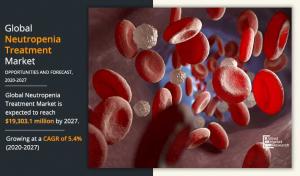5.4% CAGR for Neutropenia Treatment Market Size Worth $19,303.1 Million, Globally, by 2027 - Allied Market Research
Neutropenia market size was valued at $12,602.5 million in 2019, and is expected to reach $19,303.1 million by 2027, with a CAGR of 5.4%
PORTLAND, OREGON, UNITED STATES, February 10, 2023 /EINPresswire.com/ -- Neutropenia is a condition in which the number of neutrophils (a type of white blood cell) in the blood is lower than normal. These cells play a crucial role in the body's immune system, helping to protect against infections. When the number of neutrophils is reduced, the body becomes more susceptible to infections, which can be severe and life-threatening. The severity of neutropenia is determined by the absolute neutrophil count (ANC), which measures the number of neutrophils in the blood. An ANC below 1500/microL is considered neutropenia, and an ANC below 500/microL is considered severe neutropenia.
According to the Lancet Oncology journal, globally, 58% of new cancer patients (9.8 million out of 17 million) received chemotherapy in 2018. The report estimated that the number of new cancer cases would increase to 26 million in 2040, of which 53% (15 million out of 26 million)—an estimated 5.2 million new cancer cases — are likely to undergo chemotherapy. More than one-third of the 15 million citizens needing chemotherapy in 2040 would be residing in eastern Asia (5.2 million, 35%). In comparison, 12% (1.7 million) would live in South Central Asia, 10% (1.4 million) in South East Asia, 6% (922,452).
𝐆𝐞𝐭 𝐚 𝐒𝐚𝐦𝐩𝐥𝐞 𝐏𝐃𝐅 𝐨𝐟 𝐍𝐞𝐮𝐭𝐫𝐨𝐩𝐞𝐧𝐢𝐚 𝐓𝐫𝐞𝐚𝐭𝐦𝐞𝐧𝐭 𝐌𝐚𝐫𝐤𝐞𝐭 𝐑𝐞𝐬𝐞𝐚𝐫𝐜𝐡 𝐑𝐞𝐩𝐨𝐫𝐭@https://www.alliedmarketresearch.com/request-sample/6663
The high cost of treating neutropenia is a major factor that can limit the growth of the market. Neutropenia can require multiple treatments over an extended period of time, which can lead to significant healthcare costs. This, in turn, can reduce the affordability of these treatments for some patients, limiting their access to these treatments.
On the other hand, the transition from branded drugs to low-cost biosimilars is expected to provide growth opportunities for the market. Biosimilars are similar to original biological drugs in terms of quality, safety, and efficacy, but are generally available at lower prices. The availability of these lower-cost treatments can increase access to treatment for more patients and drive growth in the market.
Key Market Players
𝐀𝐌𝐆𝐄𝐍 𝐈𝐍𝐂., 𝐁𝐄𝐘𝐎𝐍𝐃𝐒𝐏𝐑𝐈𝐍𝐆 𝐈𝐍𝐂., 𝐂𝐄𝐋𝐋𝐄𝐑𝐀𝐍𝐓 𝐓𝐇𝐄𝐑𝐀𝐏𝐄𝐔𝐓𝐈𝐂𝐒, 𝐈𝐍𝐂., 𝐊𝐘𝐎𝐖𝐀 𝐊𝐈𝐑𝐈𝐍, 𝐌𝐘𝐋𝐀𝐍 𝐍.𝐕., 𝐍𝐎𝐕𝐀𝐑𝐓𝐈𝐒 𝐀𝐆, 𝐏𝐀𝐑𝐓𝐍𝐄𝐑 𝐓𝐇𝐄𝐑𝐀𝐏𝐄𝐔𝐓𝐈𝐂𝐒, 𝐈𝐍𝐂., 𝐏𝐅𝐈𝐙𝐄𝐑 𝐈𝐍𝐂., 𝐒𝐏𝐄𝐂𝐓𝐑𝐔𝐌 𝐏𝐇𝐀𝐑𝐌𝐀𝐂𝐄𝐔𝐓𝐈𝐂𝐀𝐋𝐒, 𝐈𝐍𝐂., 𝐓𝐄𝐕𝐀 𝐏𝐇𝐀𝐑𝐌𝐀𝐂𝐄𝐔𝐓𝐈𝐂𝐀𝐋 𝐈𝐍𝐃𝐔𝐒𝐓𝐑𝐈𝐄𝐒 𝐋𝐓𝐃., 𝐂𝐎𝐇𝐄𝐑𝐔𝐒 𝐁𝐈𝐎𝐒𝐂𝐈𝐄𝐍𝐂𝐄𝐒, 𝐈𝐍𝐂.
𝐍𝐞𝐮𝐭𝐫𝐨𝐩𝐞𝐧𝐢𝐚 𝐓𝐫𝐞𝐚𝐭𝐦𝐞𝐧𝐭 𝐌𝐚𝐫𝐤𝐞𝐭 𝐑𝐞𝐩𝐨𝐫𝐭 𝐇𝐢𝐠𝐡𝐥𝐢𝐠𝐡𝐭𝐬
𝐂𝐨𝐥𝐨𝐧𝐲-𝐬𝐭𝐢𝐦𝐮𝐥𝐚𝐭𝐢𝐧𝐠 𝐟𝐚𝐜𝐭𝐨𝐫 (𝐂𝐒𝐅): CSF is a type of medication that helps to increase the production of white blood cells in the bone marrow. This can help to boost the immune system and reduce the risk of infections.
𝐀𝐧𝐭𝐢𝐛𝐢𝐨𝐭𝐢𝐜𝐬 : Antibiotics are used to treat bacterial infections, which can be more common and severe in people with neutropenia.
𝐀𝐧𝐭𝐢𝐟𝐮𝐧𝐠𝐚𝐥𝐬 : Antifungals are used to treat fungal infections, which can also be more common and severe in people with neutropenia.
𝐀𝐧𝐭𝐢𝐯𝐢𝐫𝐚𝐥𝐬 : Antivirals are used to treat viral infections, which can also be more common and severe in people with neutropenia.
The neutropenia treatment industry involves the development and manufacture of medications and therapies designed to treat neutropenia, a condition characterized by a low count of neutrophil granulocytes in the blood. Neutropenia can be caused by various factors such as chemotherapy, radiation therapy, certain medications, and underlying medical conditions such as autoimmune disorders. Treatment options for neutropenia include medications that stimulate the bone marrow to produce more white blood cells, antibiotics to prevent infections, and intravenous immunoglobulin (IVIG) to boost the immune system.
The industry is growing due to an increasing prevalence of cancer and other underlying medical conditions that lead to neutropenia, as well as advancements in the development of new treatments. There are various pharmaceutical companies involved in the neutropenia treatment industry, including big multinational corporations and smaller specialty companies.
However, the cost of treatment can be high, and access to these treatments may be limited in some countries, particularly in low-income areas. Additionally, the lack of effective treatments for certain types of neutropenia and the potential side effects of some treatments are challenges facing the industry. Overall, the neutropenia treatment industry is dedicated to finding effective solutions for individuals suffering from this condition, with a focus on improving patient outcomes and quality of life.
𝐓𝐡𝐞 𝐦𝐚𝐫𝐤𝐞𝐭 𝐟𝐨𝐫 𝐧𝐞𝐮𝐭𝐫𝐨𝐩𝐞𝐧𝐢𝐚 𝐭𝐫𝐞𝐚𝐭𝐦𝐞𝐧𝐭 𝐜𝐚𝐧 𝐯𝐚𝐫𝐲 𝐠𝐫𝐞𝐚𝐭𝐥𝐲 𝐛𝐞𝐭𝐰𝐞𝐞𝐧 𝐝𝐢𝐟𝐟𝐞𝐫𝐞𝐧𝐭 𝐫𝐞𝐠𝐢𝐨𝐧𝐬 𝐨𝐟 𝐭𝐡𝐞 𝐰𝐨𝐫𝐥𝐝. 𝐒𝐨𝐦𝐞 𝐨𝐟 𝐭𝐡𝐞 𝐤𝐞𝐲 𝐫𝐞𝐠𝐢𝐨𝐧𝐬 𝐭𝐡𝐚𝐭 𝐚𝐫𝐞 𝐨𝐟𝐭𝐞𝐧 𝐚𝐧𝐚𝐥𝐲𝐳𝐞𝐝 𝐢𝐧𝐜𝐥𝐮𝐝𝐞:
𝐍𝐨𝐫𝐭𝐡 𝐀𝐦𝐞𝐫𝐢𝐜𝐚 : This region includes the United States, Canada, and Mexico. It is known for its advanced healthcare infrastructure and high healthcare spending, which can lead to increased access to advanced treatments for neutropenia.
𝐄𝐮𝐫𝐨𝐩𝐞 : This region includes countries such as Germany, France, the United Kingdom, Italy, Spain, and the rest of Europe. It is known for its high standard of healthcare and strong regulatory framework, which can influence the availability and accessibility of treatments for neutropenia.
𝐀𝐬𝐢𝐚-𝐏𝐚𝐜𝐢𝐟𝐢𝐜 : This region includes countries such as Japan, China, Australia, India, and the rest of the Asia-Pacific region. It is known for its rapidly growing economies and increasing healthcare spending, which can lead to increased access to treatments for neutropenia.
𝐋𝐀𝐌𝐄𝐀 : This region includes countries such as Brazil, Saudi Arabia, South Africa, and the rest of the Latin America, Middle East, and Africa region. It is known for its lower healthcare spending and lower standard of healthcare compared to other regions, which can limit access to treatments for neutropenia.
𝐐𝐮𝐢𝐜𝐤𝐥𝐲 𝐏𝐮𝐫𝐜𝐡𝐚𝐬𝐞 𝐏𝐫𝐞𝐦𝐢𝐮𝐦 𝐂𝐨𝐩𝐲 𝐨𝐟 𝐍𝐞𝐮𝐭𝐫𝐨𝐩𝐞𝐧𝐢𝐚 𝐓𝐫𝐞𝐚𝐭𝐦𝐞𝐧𝐭 𝐌𝐚𝐫𝐤𝐞𝐭
𝐆𝐫𝐨𝐰𝐭𝐡 𝐑𝐞𝐩𝐨𝐫𝐭@https://www.alliedmarketresearch.com/checkout-final/49725211d4e139064a441c2f11485d1a
David Correa
Allied Analytics LLP
+ +1 503-894-6022
email us here
Visit us on social media:
Facebook
Twitter
LinkedIn
Legal Disclaimer:
EIN Presswire provides this news content "as is" without warranty of any kind. We do not accept any responsibility or liability for the accuracy, content, images, videos, licenses, completeness, legality, or reliability of the information contained in this article. If you have any complaints or copyright issues related to this article, kindly contact the author above.

